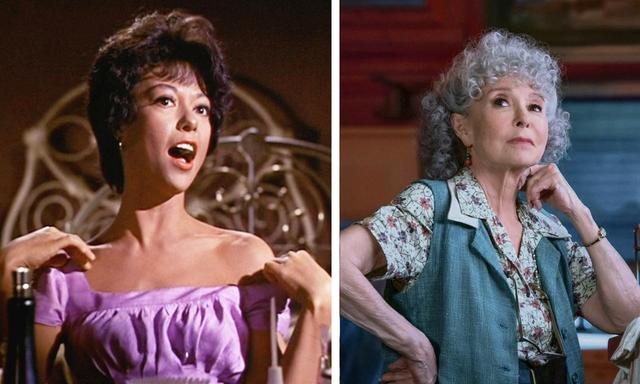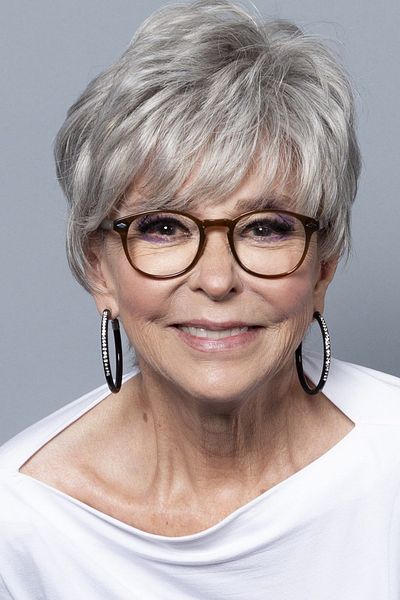We chatted with Hollywood legend Rita Moreno about the extraordinary career and life she has led.
The Oscar-winning actress is currently promoting her new documentary, ‘Rita Moreno: Just a Girl Who Decided To Go For It.’
It tracks Moreno’s humble beginnings in Puerto Rico to launching into stardom on the stage and screen. She describes that her life is defined by “a lot of struggles in between – but nobody ever sees the struggles, do they?”
Rita spoke of how surprised she was about being produced about the documentary by producer Brent Miller: “It’s not about modesty so much as thinking about your life as, well, your life, and not thinking that you’re all that different.
It took the actress a year to decide to go for it – “I just wanted to be sure that if I said yes to something like this, that my life would be treated with care and respect, and that’s exactly what they did. I think our director Mariem [Pérez Riera] did a wonderful job.”
During the so-called Golden Age of Hollywood, Moreno was often cast in stereotypical and racist roles. Her skin would be coloured darker and she’d be directed to put on an accent. At times she was cast in Native American roles. In ‘The King and I’, she played a slave brought from Burma named Tuptim.
Rita Moreno tells us: “Whenever I see the documentary and I think it’s about four, five times, it still pains me terribly to see myself in those kind of brown face, island girl roles. It’s painful, I’m embarrassed for me and I hurt for that me of that time. It’s very difficult for me to look at that.”
“I can celebrate that era but I have to separate myself from it,” she reflects. “A big reason why I decided to do the documentary was that I thought that people needed to hear about that aspect of the era, because very few people know about it.
“I wanted to be as truthful as I could be and ultimately that’s the thing that people really admire and respect about the documentary. You know that I’m not lying and that some things were difficult for me to answer. I never knew what she [Mariem] was going to ask, that was never planned. I had no idea, every time I sat down, what was going to come up.
“Ultimately it became to my delight and surprise, an extremely, exceedingly, relevant documentary to our times. Because some things have changed, and some things have simply not. And I’m talking about women, and I’m talking about race.”
The actress also spoke about her Academy award-winning performance as Anita in ‘West Side Story’, her most renowned and celebrated role. She discussed the hardship of filming its harrowing attempted-rape scene.
She says: “When I was doing that scene in the candy store – and that turns out to be the Oscar scene, I believe, and which I think is also going to happen for Ariana DeBose, who’s now playing Anita [in the ‘West Side Story’ remake] – but I was not aware of that then.
“All I was aware of was the terrible things the boys were doing to me, and of course it was acting, but still it became more and more and more real as the rehearsals went on.
“It drove me into hysterical sobs. It’s as though all of those terrible wounds and scars had not really healed well. And I truly fell apart and I remember, when I couldn’t stop crying, Robert Wise the director said ‘let’s call an early lunch.’
“I went to my dressing room and I cried some more until I was cried out, and of course at that point, the makeup artist had quite a job to do, because I am not a pretty crier. My nose leaks, my face gets swollen and bright red.”
Rita continues: “I can tell you that when I went to do that scene again this time [in the new ‘West Side Story’], as the one who stops that kind of violence, which is really in a way the role of Doc, it was so bizarre. It was so eerie and surreal, and I get that it was difficult for Ariana too but I will wager that it was not half as difficult for her as it was for me because I’d already been Anita.”
Upon being asked if there were ever fears that her role in the new movie as Valentina would simply be a cameo, she answers: “That was the first thing I thought of when Steven Spielberg called to ask would I be in the film. At the time that he called me, I already knew that he was going to do the film and I already knew that Tony Kushner was going to be the writer.
“So when Steven asked me if I wanted to do the movie, I took a long breath, and I put on my most gentle and genteel voice, and I said to him ‘Look, I really have no desire to tell you how to make your film, but I don’t do cameos, and the thought of doing a cameo in this film sounds to me as though it might be terribly distracting.’
“And at that point he interrupted me and said ‘Oh my god, no! No no, this is a real role, this is not a cameo.’ And then I became insanely embarrassed because how could I even think that this brilliant director, who also, by the way, happens to be one of my favourite, would even think of doing a cameo?
“And I asked to see the script, and it almost had wings, it was there the following morning, from LA to Berkeley, California. And I saw what it was and I immediately said yes, and he then offered to make me an executive producer – not just in name only, a real executive with opinions and dislikes and all of that.
“I was just thrilled beyond words to be in that position and to play this beautifully written character that Tony Krushner made. He and Steven call the part the heart of the movie.”
As for representation in today’s cinema, Rita Moreno says: “I don’t feel more hopeful. I feel better, but we are still severely underrepresented. I have another complaint about Hollywood which is a kind of ageism I never thought I’d have to deal with.
“Now, at my age, I just turned 90 – why do we have to be only grandmothers in these television series? And I often ask, ‘Does this character have a job, does she work, by any chance? Or is she just there to take care of her grown up children’s children and make funny, snarky remarks in this TV series?’ That’s a very serious form of ageism and it’s just something I never thought about. It’s disgraceful, it makes me very upset and angry.
“So no I’m not happy with the way it is, I’m grateful it’s gotten better, and mostly I’m grateful for seeing and watching young women feel better about themselves. That has delighted me. I love when these young women get gutsy and very strong about who they are. I really appreciate that, because that’s what’s happened as a result of the Me Too movement. And it will happen more and more and more. But there’s still a big struggle, big struggle.”
This interview has been condensed and edited for clarity.
You can buy or rent ‘Rita Moreno: Just a Girl Who Decided to Go For It’ on such platforms as iTunes, Youtube, and Google Play.



















































































